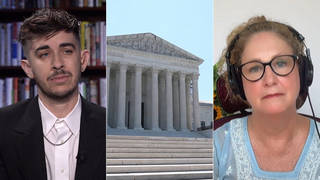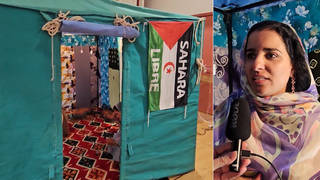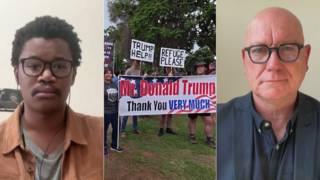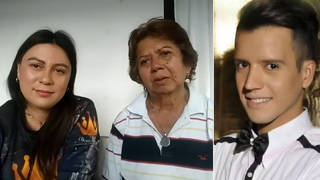
Guests
- Gwen Listerfounder and editor of The Namibian newspaper from 1985 to 2011. She was the first woman newspaper editor in southern Africa.
The African nation of Namibia found itself in the news last week after President Trump mispronounced its name during a speech at the United Nations. Trump’s reference to the nonexistent Nambia left many observers confused as to whether he was referring to the Gambia or Zambia or Namibia. White House officials later clarified to say Trump meant to say Namibia. During that same speech, Trump congratulated African leaders for helping make his friends rich. We find out more from one of Namibia’s best-known journalists, Gwen Lister, who is in Paris to speak today at UNESCO. She is the founding editor of the independent newspaper The Namibian, which reported critically on the apartheid South African regime. During the 1980s, she was jailed twice, and her newspaper’s office was destroyed by arson. The building was later firebombed in the 1990s after Namibia became independent. Gwen Lister has since become a leading advocate for press freedom. She is a founding member of the International Consortium of Investigative Journalists, which gained fame for publishing the Panama Papers, which exposed how the world’s rich used tax havens to hide their wealth. Gwen Lister is speaking today here at UNESCO to mark the International Day for the Universal Access to Information.
Transcript
AMY GOODMAN: This is Democracy Now!, democracynow.org, The War and Peace Report. We’re broadcasting from the headquarters of UNESCO in Paris, France, where a conference is going on about the importance of the free flow of information around the world. Well, the African nation of Namibia found itself in the news last week after President Trump mispronounced its name during a speech at the United Nations.
PRESIDENT DONALD TRUMP: Uganda has made incredible strides in the battle against HIV/AIDS. In Guinea and Nigeria, you fought a horrifying Ebola outbreak. Nambia’s health system is increasingly self-sufficient.
AMY GOODMAN: President Trump’s reference to the nonexistent Nambia left many observers confused as to whether he was referring to the Gambia. Or was it Zambia? Could it be Namibia? White House officials later clarified to say Trump meant to say Namibia. During that same speech, Trump congratulated African leaders for helping make his friends rich.
PRESIDENT DONALD TRUMP: Africa has tremendous business potential. I have so many friends going to your countries, trying to get rich. I congratulate you. They’re spending a lot of money.
AMY GOODMAN: Well, that was President Trump at the United Nations. We’re joined now by one of Namibia’s best-known journalists, Gwen Lister. She’s in Paris to speak today here at the UNESCO talks, founding editor of the independent newspaper The Namibian, which reported critically on apartheid South Africa, to say the least. During the '80s, she was jailed twice. Her newspaper's office was destroyed by arson. The building was later firebombed in the 1990s after Namibia became independent. Gwen Lister has since become a leading advocate for press freedom. She’s a founding member of the International Consortium of Investigative Journalists, which gained fame for publishing the Panama Papers, which exposed how the world’s rich used tax havens to hide their wealth. Gwen Lister is speaking today here at UNESCO to mark the International Day for the Universal Access to Information.
Gwen Lister, it’s great to have you here at Democracy Now!
GWEN LISTER: Thank you, Amy. Good to be here.
AMY GOODMAN: So let’s talk about your country, about—well, why don’t you share with the world how exactly you pronounce Namibia.
GWEN LISTER: Namibia.
AMY GOODMAN: Now, I won’t say this was big news in the United States, which gives very little coverage to Africa, what President Trump said. But talk about what he said about your country.
GWEN LISTER: Well, I think the news of the Nambia mispronunciation was received, obviously, with some laughter by Namibian—not only Namibians, but Africans further afield. Unfortunately, I was of the view that there was Trump at a dinner with all the African leaders, and not one of them bothered to correct him. But I think Twitter did the rectification later. And according to our president later, Trump put Namibia on the map, simply by the mispronunciation.
AMY GOODMAN: So, talk about what he was referring to, the healthcare system.
GWEN LISTER: Well, he referred to the healthcare system, and I wasn’t quite sure exactly why he referenced our healthcare system as one of the best in Africa. It probably is decent by African standards, but I think it had more to do with the fact that probably all he knows about our healthcare system is the fact of the PEPFAR involvement in fighting the scourge of AIDS.
AMY GOODMAN: And explain what that is, PEPFAR.
GWEN LISTER: Well, PEPFAR is, obviously, some—George W. Bush started it, giving fairly substantial funds to fighting AIDS in Namibia.
AMY GOODMAN: And then talk about what Trump said about his friends getting rich. You tweeted, “There’s no question about #Trump’s colonial get-rich-quick mentality.” You said you “just wish the leaders of #Africa had the guts to call him out on it.”
GWEN LISTER: Exactly. Well, obviously, I think Africa needs and wants investment, but they want sort of good, ethical investment and not just people who are coming out as the previous colonial regimes did and simply fleeced African countries of the wealth and, you know, allowing all the money to leave the continent, as happens so often with a lot of these investors, so-called.
AMY GOODMAN: You’re here in Paris at UNESCO headquarters at the IPDCtalks to talk about press freedom. Give us your own story, Gwen. Just share your stories about you as a journalist taking on apartheid, apartheid South Africa, and what it meant for you.
GWEN LISTER: OK. Well, it seems like a very long time ago, really, and it is. But, obviously, I felt it was very important back in the '70s and the ’80s to really show that there was resistance within Namibia, in my case, to the policy of apartheid. As you're probably aware, at that time, very few so-called whites objected to those policies. I felt it was very important, in the first place, to do that; secondly, for a newspaper to be the voice of the voiceless people, because, obviously—and that’s very relevant to access to information today—is the fact that, obviously, we were totally dominated by South African propaganda at the time. But further afield in Africa wasn’t great, either. I mean, there were a number of draconian governments in power in Africa, and they tended to control the means of information and all the media.
And so, I think probably one of the more significant things in my journalistic career was having the honor to chair—and I will reference it today—the 1991 UNESCO conference in Windhoek, which ended up—and it was a conference of African journalists, some of whom had been released from jails, Cameroon and elsewhere, to attend the conference. And that is where African journalists really affirmed the importance of an independent, pluralistic and free press for the continent. And I think it brought about a lot of change, at least in perceptions and more acceptance of press freedom. And I think that was definitely a milestone moment. And Namibia was really chosen as the venue for this, because Namibia had finally attained its independence in 1990 with a constitution which provided for all those fundamental human rights and freedoms.
AMY GOODMAN: And talk about your own experience with jail.
GWEN LISTER: With jail. Well—
AMY GOODMAN: What happened, why you were jailed.
GWEN LISTER: On most occasions, it had to do with secret documents. The one case which was probably the most notorious, famous, whatever you like, was when I went to collect my mail one day. And—
AMY GOODMAN: What year was this?
GWEN LISTER: This was in 1984. And I—
AMY GOODMAN: This was what? Six years before Nelson Mandela was released, 10 years before the multiracial—
GWEN LISTER: That’s correct.
AMY GOODMAN: —elections in South Africa.
GWEN LISTER: That’s correct. And it was, in fact, in the year where I was trying to set up The Namibian and find the funding. So—
AMY GOODMAN: And just for people who aren’t aware, explain Namibia’s relationship with South Africa. Namibia used to be called South West Africa.
GWEN LISTER: Absolutely. Namibia, yes, was seen as a sort of a colony of South Africa and governed as such, and, as I said, was, as you mentioned, South West Africa, which we, even at the time prior to independence, regarded more as a geographical direction than the name of a country. And so, just before we started The Namibian, we decided—in fact, we were the first to use that name inside the country. Even the liberation movement at the time fighting against South African occupation were known as South West Africa People’s Organization, SWAPO. But we used the name for the newspaper, and, obviously, that caused huge controversy at the time.
But to jump back a little bit, my arrest was mainly because I had been to my post office box one day to collect mail and thought I’d come back for it later. And when I came back, the mailbox was empty. So I called the postmaster general and said there’s something very strange happening. He said he would inquire. And it wasn’t a matter of two, three days where I got a registered envelope in the post with “top secret” all over it, and it had been sent to me in error. And it was actually for the interception of all my incoming and outgoing mail for reasons of state security. So, I released this document to the media and was immediately arrested under the Official Secrets Act. So I spent about a week in jail for that, and I was warned of charges in terms of the act, but they were later dropped, I think mainly because it was going to be quite a big embarrassment to the South African government at the time.
AMY GOODMAN: And the second time, Gwen, that you were arrested?
GWEN LISTER: The second time was also about a secret document, which, during the transition phase, South Africa had put in place in Namibia a kind of an alternative government, if you like, of local Namibians to try and keep the possibility of a SWAPO government at bay and also, of course, to keep Resolution 435, which was the U.N. resolution providing for elections for Africa’s last colony, to stop that from happening. So they installed a government of their choice, and that government had advised of sweeping new powers for the police. And I had got hold of this document, published it, and was subsequently arrested under detention-without-trial legislation.
AMY GOODMAN: I wanted to ask you—this is a story from a few months ago, but in New York, a second hearing was scheduled in the case of two indigenous Namibian tribes that are suing the German government to demand compensation for Germany’s genocide of 100,000 people in now-Namibia between 1904 and 1908, the killings carried out by German imperial troops when the region was a German colony. And that goes to a little more history for—
GWEN LISTER: Right.
AMY GOODMAN: —for viewers and listeners around the world. Before Namibia—
GWEN LISTER: South African tribes.
AMY GOODMAN: Yes. Explain.
GWEN LISTER: Well, basically, it’s been something that has only really come up in the last couple of years. It may or may not have to do with the fact, primarily, that, obviously, Namibia’s economy is pretty depressed. There’s fairly large-scale unemployment. Figures are not terribly reliable, but they’re certainly over about 40 percent. The Herero-speaking group in Namibia, which was the tribe most decimated under German colonial rule, also the Nama people, are not pleased with the German government, which I think is our hugest development aid partner. They have given massive amounts of money, in lieu of that genocide, I think. But now the local inhabitants really feel that’s not enough, and they want, obviously, a very formal apology, plus—plus they’re demanding millions. And so they’ve chosen to go to court in the U.S. at the same time that bilateral negotiations are happening with the Namibian government and the German government about the genocide issue.
AMY GOODMAN: Finally, Gwen Lister, as people here at UNESCO today are talking about internet freedom and the free flow of information, Namibia is currently holding an Internet Governance Forum. Talk about the goals that you feel Namibia should have, going forward, and what the challenges are around internet and digital freedom, who has access also, and who doesn’t.
GWEN LISTER: Right. Africa, mostly, Namibia also, the access to information via the internet is mainly via mobile phone. Internet, actual computer/laptop penetration, is very little indeed. So most people have a mobile phone.
Namibia, it must be said, kind of tops the rankings of press freedom in Africa, and that’s been acknowledged by Reporters Sans Frontières and other groups, CPJ and others. So, we’re in a fairly good position. And I think that has a lot to do with the fact that we have this kind of advocacy activism all the time.
We need to closely guard those freedoms. Democracy is a very fragile thing. They are very special to us. But there are still threats. Namibia, at the moment, is, for example, looking at implementing or putting before Parliament a cybersecurity law. And as we all know, cybersecurity is a very real issue in the world today. But often disguised and hidden in a law like that are possible infringements on access to the internet and monitoring of social media and so on. So, through the Namibian Media Trust, which I now head, which owns The Namibian, we monitor these kind of laws on an ongoing basis.
Access to information is another law that has been promised by the Namibian government. And we actually work together with a group of research institutions, media, developmental organizations, to draft an ideal, progressive ATI law. But, unfortunately, the government are kind of sitting on that.
So, again, there’s a lot of good intent, but also behind that are, and definitely, some political machinations to take away those freedoms. So I think it’s something that even though people can say we’re free, we’re not going to be free forever, unless we really guard those freedoms jealously.
AMY GOODMAN: I want to thank you very much, Gwen Lister, for joining us. Gwen Lister, the founder and editor of The Namibian newspaper from 1985 to 2011, the first woman newspaper editor in southern Africa. And before we go, quick question about climate change. You know that our president, the one who mispronounced your country’s name, is a proud climate change denier. The effects of climate change in Namibia?
GWEN LISTER: Well, of course, we have the extremes of terrible drought. We’ve just come out of—we had some rain last year, but we’ve come out of a three-year period of really debilitating drought. Even before I came here today, I mean, the temperatures in Namibia right now—and, I mean, it’s September, which is really spring—are sort of 40 degrees. And, I mean, I’ve lived there for decades, and I’ve never—
AMY GOODMAN: Centigrade.
GWEN LISTER: Absolute, yes. And I’ve never felt it actually that hot. And then, of course, on the other extreme, when we finally do get rain, often it’s a question of having floods. So, definitely in Namibia, the climate change issue is very real indeed.
AMY GOODMAN: Gwen Lister, thanks so much for joining us. She is a first, the first woman newspaper editor in southern Africa. When we come back, the first woman president of Finland. This is Democracy Now! We’ll be back with her in a moment.













Media Options